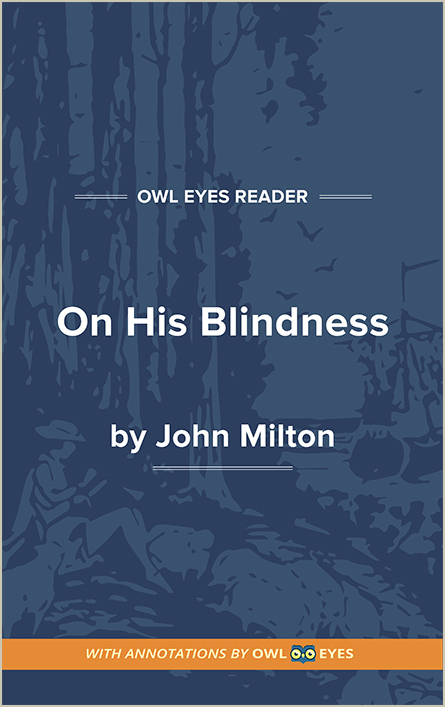- Annotated Full Text
- Literary Period: Renaissance
- Publication Date: 1673
- Flesch-Kincaid Level: 11
- Approx. Reading Time: 0 minutes
On His Blindness
Most people know Milton as the writer of Paradise Lost, the epic poem detailing Adam and Eve’s fall from Eden. However, most people do not realize that Milton had an extremely robust political career before composing his epic. During the English Civil War, Milton was an anti-monarchist. He wrote tracts proposing that people hold divine-right monarchs accountable for their actions, as well as a text that sanctioned both the beheading of King Charles I in 1649 and the institution of Oliver Cromwell’s republic. In 1652, Milton went blind due to complications from glaucoma. In a time before braille and other technologies to facilitate sightless reading, Milton’s blindness could have been a career-ending impairment. In “On His Blindness,” Milton expresses his anxiety that without his sight, he will no longer be able to exercise his “one talent” as a writer and poet. Without his poetry and prose, he cannot serve God. Over the course of the poem, Milton comes to realize that God does not need his talent, only his faith and love. Patience, a personified character, speaks the last lines of the sonnet, assuring the speaker that while some serve God by carrying out his bidding, others serve God by simply “standing and waiting” for him to present his will and plan to them. The poem resolves in the comfort that waiting for greatness to present itself is just as worthy as carrying out great deeds. After all, it would not be until 1667 that Milton would publish his magnum opus, one of the most famous epics in English literature, Paradise Lost.
- Annotated Full Text
- Literary Period: Renaissance
- Publication Date: 1673
- Flesch-Kincaid Level: 11
- Approx. Reading Time: 0 minutes

